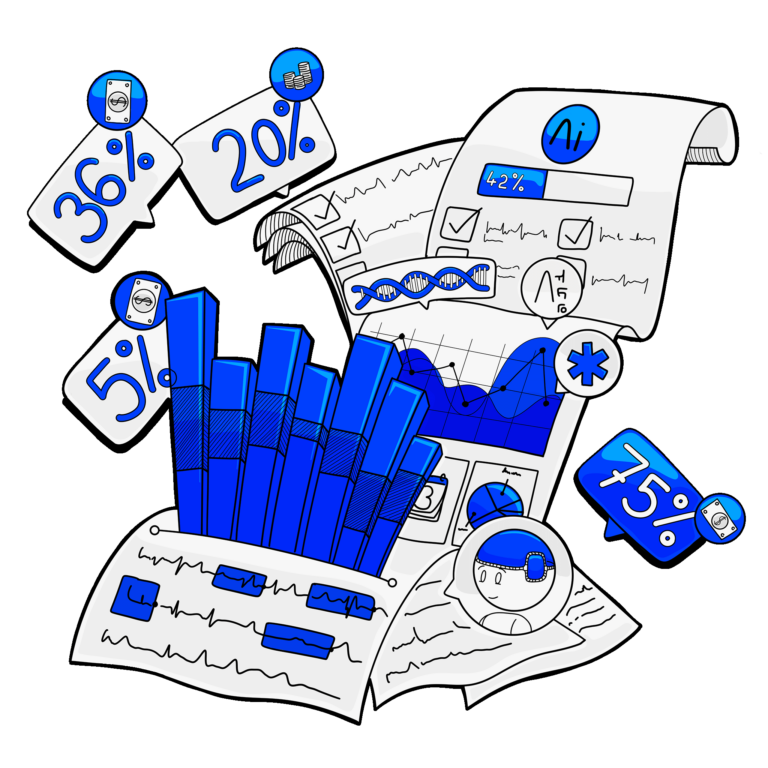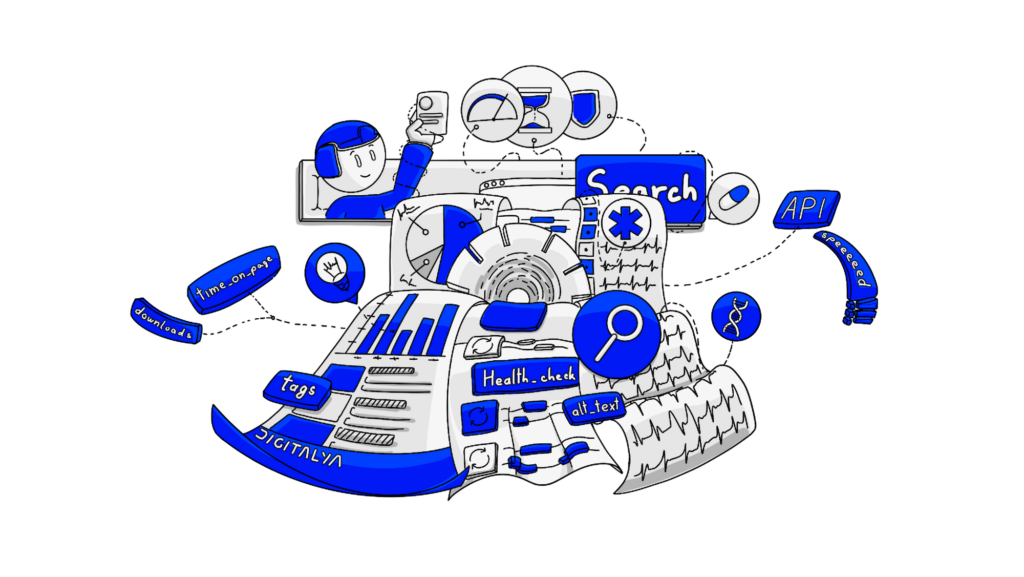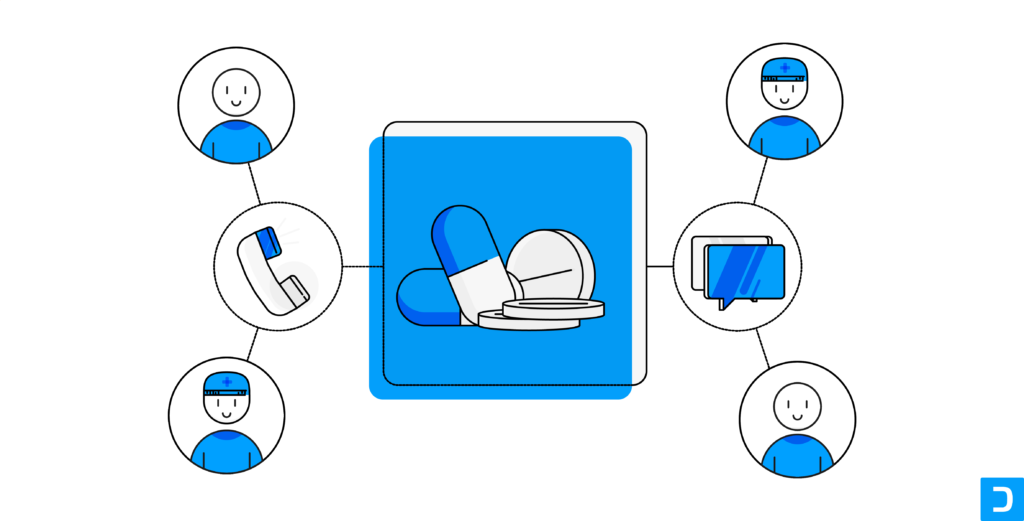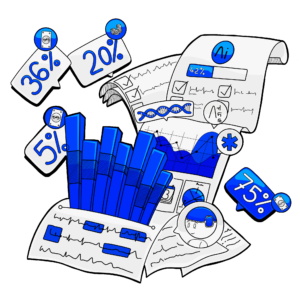The past few years have made us ever more aware of how important our health is. Not only has the importance of staying healthy been painfully pointed out, but it has become very clear that we also need fast and efficient access to medical care.
With so many activities moving online, people ask for easier, more immediate access to doctors and medical services. Thus the flourishing development of medical software.
But that is one side of the coin.
The other is subtler – the health insurance that allows access to medical care. That, too, requires efficiency and real-time responses for the entire healthcare system. This includes insurance providers, medical services providers, and, of course, patients.
This is where health insurance software development comes into place.
1. What is software project estimation?
In short, It refers to custom software development that will serve a health insurance company to run their business more efficiently and create a better user experience.
Health insurance software development encompasses a set of tools that automate insurance claims, data collections, billing processes, end-to-end communication, and document management and provide relevant reports and statistics.
It seems to have a lot of functionalities for one piece of insurance software.
Yes, but the insurance business is complex, too.
A health insurance company needs to sign and renew insurance policies daily and run claims management, risk management, and insurance agents while maintaining a good customer relationship. This is just the “airplane view.” Imagine that each of these categories of tasks has its own set of activities.
Insurance software solutions digitize and automate most of them to save time and money for carriers, brokers, agencies, or agents.
The need for developing health insurance software is felt more acutely especially in the United States, as medical treatment and care are not possible (or not at the necessary level) without the coverage of a sufficient enough health insurance policy.
2. Health insurance software types
We’ve seen the complexity of managing health insurance. Ideally, health insurance software development should cover all the needs of an insurance company.
While you may find the “all in one” type of insurance software, the more realistic approach is to consider different bits for focused activities.
Let’s take a look at the types of health insurance software that you may develop or have developed for you, based on the categories of end-users.
Health insurance application for patients
This type of insurance app makes it possible for patients to select and buy a customized health care policy fast and with the least effort, even remotely.
With the help of such software, patients can also find doctors within their health insurance network or access specialists and health services based on preferences.
Taking a step even further, such insurance software can make possible the integration with medical systems, so insurance claims and payments can take place automatically. The patient wouldn’t need to bother with the bureaucratic fuss and focus on getting better.
Health insurance application for the insurance companies
An insurance company, especially in the healthcare sector, has to deal with a large number of insurance policies and claims, including all the documentation required, not to mention compliance verifications and updates.
Health insurance software automates most of these activities, the entire workflow management from policy and claims management, signing new policies, evaluating risks, providing real-time data to field agents, etc.
Health insurance application for healthcare providers
Even healthcare providers can benefit from health insurance software development. It helps them to keep track of calls and payments from specific insurers or patients, and access patients’ documentation needed for treatment, based on data registered by the health insurance provider.
Very importantly, they can check right away the eligibility of a patient for certain types of treatment, according to his insurance policy.
And these are just a few of the functionalities that health insurance software can provide for healthcare institutions, to help them save time and money.
Of course, when it comes to healthcare insurance, the process is similar to healthcare app development and it can even be designed to serve all three categories of users in one app.
3. Why does your company need to develop software for health insurance?
We agree that the process of health insurance software development, like any medical app development, takes some effort and investment. So, you should have a clear view of the benefits before embarking on such an endeavor.
First, let’s take a look at some numbers in the healthcare market.
McKinsey estimated that the private health insurance market at a global level would reach, in 2025, $2.6 trillion. Not billion, but trillion. That shows that the health insurance market is striving. As probably expected, the United States is, indeed, the largest health insurance market. Within 11 years, since 2010, the number of insured citizens grew by over 40 million, reaching 300 million health insurance policies in 2021.
The competition is harsh in the health insurance market, which is why insurance companies look to stay up to date with the latest business and customer relationship approaches.
This is why they start focusing on health insurance software solutions, particularly health insurance apps to increase customer satisfaction rates, in order to sign more policies.
So, if we were to go through the main benefits of developing health insurance apps, here are the main ones:
1. Better customer experience
Happy customers attract more customers. Automated claims management, along with an easier, faster way to view health insurance plans and sign insurance policies are just some features that would make clients’ lives much easier. The easier it gets to interact with medical insurers, the more people will seek to sign up.
2. Efficiency and productivity
By eliminating a lot of manual work, paper documents management, and time spent on informative meetings with agents you gain a lot of valuable time to focus on new leads and existing clients, doing the relevant work. Just like any other management software, an insurance application can ease the “behind the scene” activity of an insurance company. It means more things are done, at less cost, and in less time.
3. Data analytics
Medical insurance applications are great sources (provided the privacy policy is respected) for relevant customer data that can help develop better health insurance products and anticipate clients’ needs and market trends.
4. Team augmentation
An insurance mobile app with a module for agents can make it much easier to communicate with the sales team while helping them be more efficient in their fieldwork: real-time information to show their prospects, staying up to date with compliance and medical industry changes only a few clicks away, etc. This will encourage more people to join your team and help develop the business.

4. Health insurance software solutions examples
Let’s take a look at some examples of health insurance apps that are presently popular.
- Cigna is a digital health platform focused on helping people find the health insurance plans they need. It also has modules for brokers, employers, medicare, or providers. It also helps people check what drugs or treatments are covered by their policies and get in touch with doctors in the insurance network.
- OscarHealth is one of the insurance software solutions for patients that provides ease in finding and signing the appropriate insurance plan. It also connects patients with doctors. However, this insurance platform is built for the U.S. market.
- AgencySmart is a cloud-based platform for agents and brokers, that automates customer relationships and insurance management. It also works as financial software, on top of its CRM function.
- AgenyAdvantage is another agency management solution that serves the best independent insurance agents. It helps them with document management, claims management, and insurance policy management, while also automating the issue of quotes and estimates.
- Plexis works as an insurance platform for claims management in the healthcare sector. It also automates administrative processes for health insurance providers.
- iNube is a web broker’s platform that also has insurance mobile versions for various types of use cases. It uses the power of digitization to create a better user experience for brokers, as well as for their clients.
If you are curious to see what else goes on in the healthcare sector, we’ve written about the top healthcare apps.
5. Pros and cons of health insurance software
Just like any change, to digitally transform the traditional way of managing health insurance is not easy to accept and implement.
The resistance to change should not be ignored, but accepted and treated with an open mind: What are the obstacles? Which fears prevent people from adopting a mobile application for health insurance? Which are the pros and cons of health insurance software, that we can address?
Understanding the benefits together with the restraints is the way to adopt any change and evolve sustainably.
Pros of health insurance software
Efficiency
When you opt for management software, regardless of the business, you bring in the benefits of automation. Hundreds of repetitive tasks and work hours are saved thanks to algorithms.
When you add machine learning and artificial intelligence to your management systems, the work of managing health insurance policies, clients, agents, and the company itself does not only become more efficient but productivity increases. Risk assessments, for instance, can be done faster and with greater precision.
Health insurance software can accomplish more tasks faster, more accurately, and even in anticipation of future needs – something that would require people considerably more effort and would cost the company more money.
Better customer experience
With the help of a health insurance application, it will get much easier for clients to find the health insurance plans that are right for them, sign in and renew them from the comfort of their homes at any time of the day.
Having medical insurance app will make it much easier to check the available medical services covered by the policy, see how much of the costs can be covered, and deal with payments without the fuss of the usual paperwork and phone calls. Happier clients translate into more health insurance policies.
Better communication with agents
Insurance software solutions are also a great help in managing the sales team. Insurance agents deal with a lot of pressure and paperwork themselves and they constantly need real-time information to present to clients, to convince and to sign new policies. Time and accuracy are of great importance in their work.
Health insurance apps can perfectly serve this side of the job by providing real-time information, improving communication within the team, and keeping the agents up to date with the latest news regarding the healthcare sector.
Analytics and reports
Another advantage of health insurance software is the data that health insurance companies can obtain and use to improve their services and customer relations.
The type of medical services most accessed by clients, the healthcare institutions preferred, or with the most health insurance claims – these are just some of the information that can be centralized and interpreted to help develop insurance products and services, even partnerships.
Cons of health insurance software
Looking at the list of advantages, it is easy to think that all is bright and there should be no barriers to going ahead with developing health insurance software. Still, there are challenges that should not be ignored when making this decision.
Cost
Whether you go with a software development company or decide to build a dedicated team in-house, there will be expenses.
Usually, working with development teams from IT companies that have the experience and expertise in custom software development involves fewer costs than having to build the same software in-house.
It is a matter of the learning curve, hours needed to get the hang of things, doing the research, building the team dynamic, etc. In some cases, this effort may be justified. It is about the cost/ benefit ratio.
Data security
The paper-based system has a strong advantage – the papers are there physically, and losing them is a matter of exception. With digital data, while there are many security and backup protocols in place, the risk of losing them (or losing access to them) is worth considering.
Yes, digital has the advantage of storage volume, but you need to make double sure that those large volumes of digital information are in safe keeping, accessible anytime, under any conditions.
Data Privacy
Like in all cases of dealing with digital data, client privacy is of utmost importance. Any insurance application has to provide strong privacy protection, especially when dealing with health-related data.
This is, probably, the most sensitive type of data.
Insurance companies rely on trust, so securing their clients’ rights to privacy needs to be a top priority when considering health insurance software development.
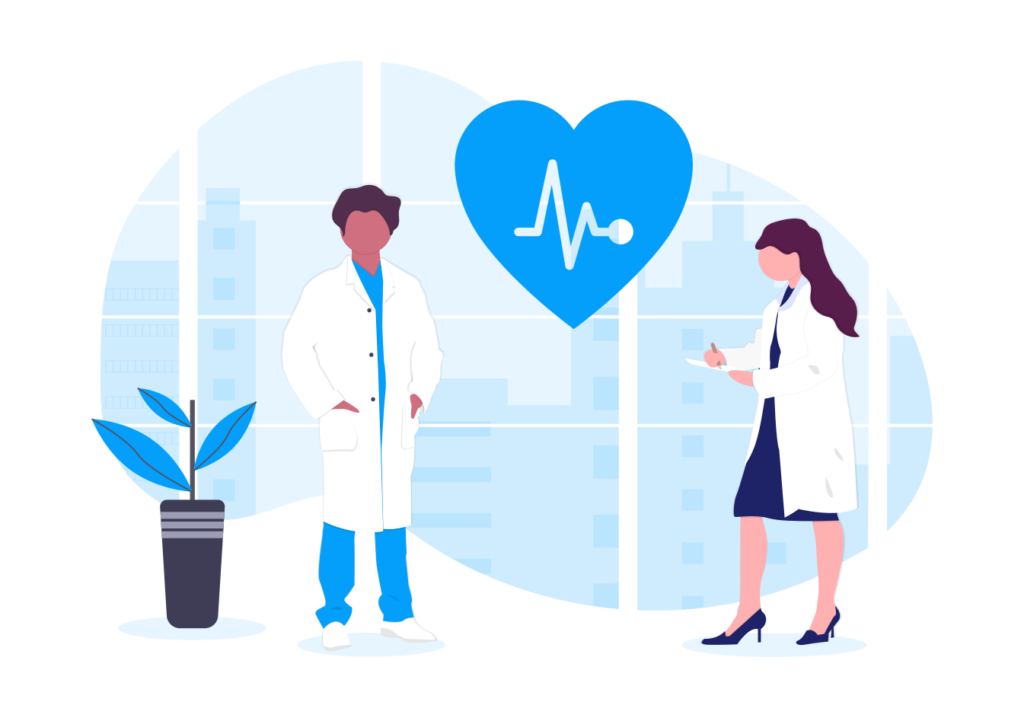
6. What to consider for health insurance software?
No doubt that the list of advantages is in favor of developing health insurance software. So, the next question is what to consider when making this important step for your business.
Complexity
One of the first questions is how specific you need this software to be. Do you want (or need) a comprehensive one, that would serve as CRM, ERP, and mobile application for clients altogether? Or do you want to focus on a narrower range of functionalities? Which are your objectives and priorities?
Degree of customization
Depending on the answers about the complexity of health insurance software, think about how customizable you need it to be. Are there any particularities of your insurance business or client relationship that you need to cover? Can you work with “built for all purposes” software, or do you need a number of personalized functions?
Cloud-based or on-premise
This is a question most software companies and insurance app developers ask at the first meeting. Cloud-based apps are the most used due to their advantages (storage capacity, accessibility, etc.). Still, there are cases (especially when data security is involved) when an on-premise insurance platform makes more sense.
Integration and UX design
When discussing insurance software development, take into account the other systems and third-party apps, even the website with which it needs to be integrated.
There is no point in investing in an isolated application because you won’t benefit fully from the increased efficiency and productivity it can deliver if well integrated with other tools.
Also, no matter how well it works, your insurance app won’t be a success if it lacks quality UX design. So, having in your team a good UIUX designer is very important.
Security and Compliance
Data privacy and security should be among your priorities, especially when dealing with health-related data.
So first, make sure you can secure the system that will keep all those client data safe and private. In addition, compliance with local and national health regulations is also very important.
Otherwise, your health insurance app won’t be used. For the U.S. insurance market, for instance, like in the case of medical application development, consider HIPAA compliance.
In conclusion – yes, there are expenses and challenges, also important details to consider, but stepping forward to health insurance software development is no longer a nice-to-have but a must of our increasingly digitized society.
The good news is that there are many professionals out there and experienced development companies that can walk you through this process and help you obtain the right software solution for your insurance business.

